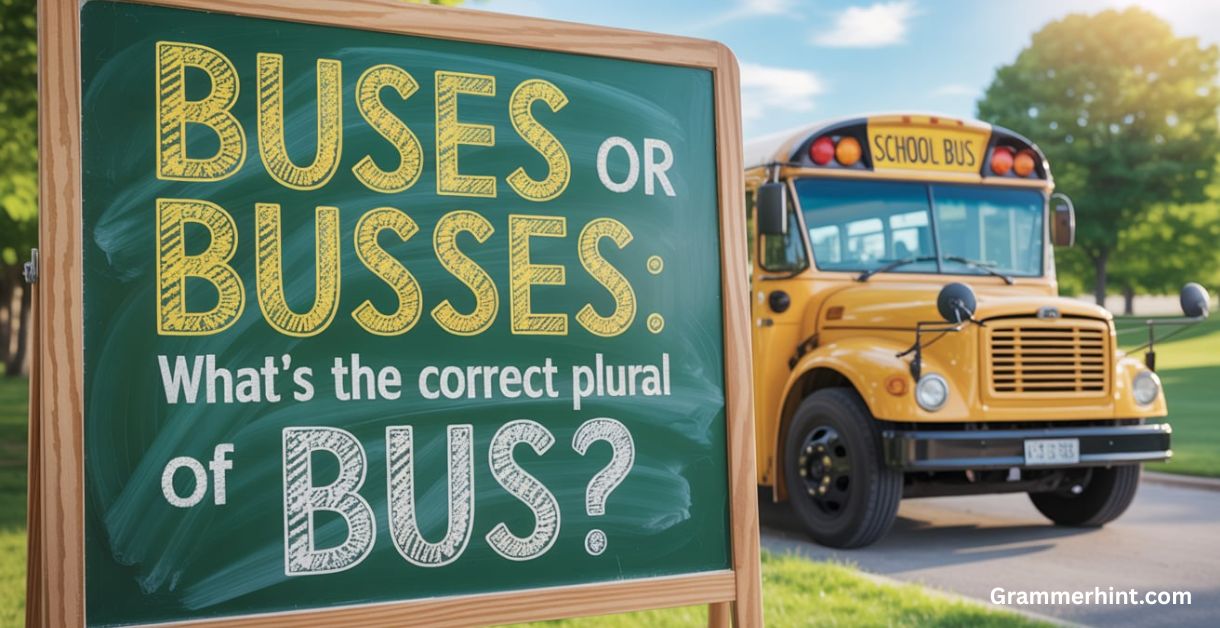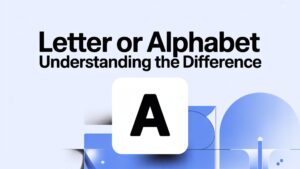When you hear the word “bus,” your mind probably jumps to public transportation, school buses, or maybe even a tourist coach winding through a scenic route. But have you ever stopped to wonder: What’s the plural of bus?
Is it buses or busses? And why is there so much grammar confusion over a seemingly simple word? Let’s dig into the English language rules, spelling conventions, and even take a detour into computing terms to fully understand the correct usage.
Why Is There Confusion?
The confusion comes from two core issues:
- Spelling variations due to older forms of English or regional preferences.
- The existence of a separate word, “buss,” which means something entirely different a kiss.
Many people ask, “Is it buses or busses in modern English?” The answer is both simple and surprising.
“Buses or Busses”: The Correct Plural of “Bus”

The correct plural form of “bus” is buses.
This follows the modern grammar standards and is endorsed by dictionaries like Merriam-Webster, Oxford English Dictionary, and Cambridge.
So why do some people still use “busses”?
- “Busses” is sometimes used as an outdated spelling, and may appear in 18th and 19th centuries literature.
- In other cases, it refers to the noun “buss”, meaning a kiss.
Therefore, if you’re asking “What’s the plural of bus?” or “What is the bus plural form?” — the grammatically correct answer is always: buses.
Email Example (Correct):
Subject: Monday Morning Transportation Schedule
Hi Jenny,
Please make sure all school buses are ready to leave by 7:15 AM. The bus fleet will cover Routes A through D.
Best,
Michael Reynolds
Transport Coordinator
What Is a “Bus”?

The word “bus” is short for “omnibus”, which comes from Latin and literally means “for all.”
Definitions of “bus”:
- Bus (noun, object, public transport): A large motor vehicle carrying passengers by road.
- Bus (computing term): A pathway used for data transfer between the components of a communication system.
In transportation:
- You have tourist buses, minibuses, coaches, charters, shuttles, and city transit vehicles.
In computing:
- A data bus, address bus, or control bus helps the CPU, memory, and peripherals communicate.
Email Example (Computing):
Subject: CPU and Memory Configuration
Hi Arjun,
When reviewing the bus architecture (computing), ensure that the data buses align with the latest hardware specs.
Cheers,
Nancy Yu
IT Systems Analyst
Words with Similar Pluralization Rules
Many English nouns that end in “s” or have complex endings follow unusual pluralization rules. Here’s a short list to compare:
| Singular | Correct Plural | Common Mistake |
|---|---|---|
| Bus | Buses | Busses |
| Kiss | Kisses | |
| Class | Classes | |
| Box | Boxes | |
| Chef | Chefs | Cheves |
| Syllabus | Syllabuses/Syllabi | Syllabuses? |
These help reinforce that the plural spelling “buses” aligns with modern grammar standards.
Alternative Terms for “Bus”
Depending on region and context, different terms are used instead of “bus.”
- Coach (UK)
- Shuttle (Airport or hotel)
- Transit vehicle (Government/public planning)
- Charter (Private rental)
- Minibus (Small-sized version)
In computing, we may refer to:
- Bus architecture
- System bus
- Communication system
These variations don’t change the correct plural form of “bus,” which remains buses in all modern writing.
Sentences Using “Buses”
Here are examples of the plural of bus used correctly:
- The buses were late due to heavy rainfall.
- All the school buses are equipped with seatbelts.
- Our public transportation relies heavily on electric buses.
- They added more tourist buses for the summer season.
- Engineers are redesigning data buses for faster transmission.
Common Misuse: “The busses were lined up outside the school.”
Corrected: “The buses were lined up outside the school.”
Etymology of “Bus”
The word “bus” traces back to the early 19th century.
- Derived from “omnibus”, Latin for “for all.”
- Originally referred to public transport vehicles open to all citizens.
- In computing, the term evolved to represent communication systems for data transfer.
Historical usage:
In the 18th and 19th centuries, “omnibus” was shortened for convenience. Over time, “bus” became the standard in English (language).
Fun fact: The word “bus” in Australia has also contributed to the idiom “miss the bus,” meaning to miss an opportunity.
Conclusion
So, what’s the plural of bus? It’s time to put this debate to rest.
- The plural of “bus” is buses.
- The form “busses” is either a grammar mistake, an outdated spelling, or refers to kisses.
- This applies across both transportation systems and computing contexts.
Understanding the difference in buses vs busses clears up a lot of confusion for both native speakers and English learners. Whether you’re scheduling a bus fleet for a school district or troubleshooting bus architecture (computing), knowing the correct plural form helps maintain clarity.









